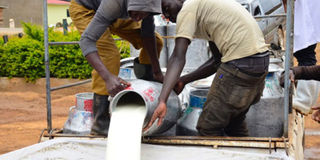Uganda’s milk is safe – govt

Uganda has previously faced bans on its food products such as milk and fish from the EU, Kenya and Rwanda over safety concerns. PHOTO | FILE
What you need to know:
- Addressing the media at Uganda Media Centre on Wednesday, the executive director of Dairy Development Authority, Mr Michael Kansiime, assured Ugandans that several mechanisms have been put in place to ensure quality in the dairy sector.
Government has dismissed claims that milk on the Ugandan market is unsafe for human consumption, contrary to claims by some scientists.
Addressing the media at Uganda Media Centre on Wednesday, the executive director of Dairy Development Authority, Mr Michael Kansiime, assured Ugandans that several mechanisms have been put in place to ensure quality in the dairy sector.
“We are here to give more information particularly on the dairy sector and people should appreciate that Uganda’s milk is safe and government has invested a lot of resources to make it safe,” he said.
Mr Kansiime attributed the progressive developments to good quality that has seen the dairy sector growing exponentially and the market widening.
According to statistics from Dairy Development Authority, there has been an increase in milk production over the last four years.
In 2018, Uganda produced 2.51 billion litres of milk, 2.52b, 2.6b and 2.81 billion litres for years 2019, 2020 and 2021, respectively.
However, Mr Kansiime said the increase in milk production is not relative to the local consumption, where Uganda consumed only 800,000 litres of the 2.81 billion litres of milk produced in 2021. This implies that much of Ugandan milk is sold abroad, which is a proof that it is safe.
“Out of the 2.8 billion litres of milk produced in 2021, Uganda only consumed 800,000 litres, meaning we have to sell our milk somewhere, more especially to our key export market like East African Community regional countries, Malaysia, India, Japan, USA….” he said. Some of the measures government has put in place to ensure quality and safety of milk include registration of dairy businesses, inspection of milk handling premises, market surveillance, conducting proficiency testing and inter-laboratory comparisons.
This is not the first time issues concerning the quality of Uganda’s milk have been raised.
In March, this publication ran a story where researchers at Makerere University said they had detected worrying levels of cancer-causing agents in the milk.
The development was reached after 14 milk samples collected from the three districts of Kampala, Mukono and Wakiso were analysed at Makerere University’s Department of Food Technology, and the Department of Geology and Petroleum Studies laboratories.
In his remarks, the Dairy Development Authority boss encouraged Ugandans to consume milk from licenced facilities, as well as rally farmers to observe good farming practices.
“...We are committed to ensuring that all the milk and milk products on the market meet the highest standards for human consumption,” Mr Kansiime remarked.





